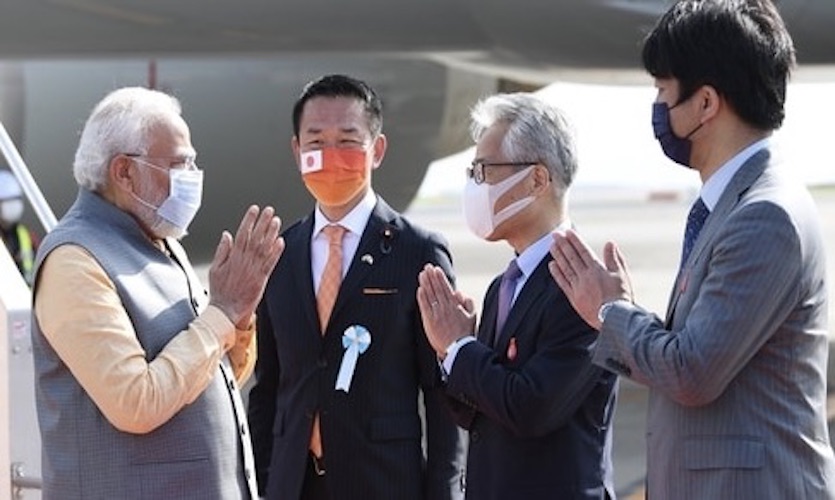On Monday, Indian Prime Minister Narendra Modi arrived in Tokyo on a two-day visit to attend the Quad leaders’ summit. The summit aims to further bolster the cooperation among its member nations and discuss developments in the Indo-Pacific region. US President Joe Biden, Australian PM Anthony Albanese, and Japanese PM Fumio Kishida were also in attendance.
Upon his arrival in Tokyo, Prime Minister Modi posted a picture of being received at the airport by the Japanese delegation. He tweeted, “Landed in Tokyo. Will be taking part in various programmes during this visit including the Quad Summit, meeting fellow Quad leaders, interacting with Japanese business leaders and the vibrant Indian diaspora.” During his visit, PM Modi is scheduled to have 23 engagements in around 40 hours of his two-day visit, including the Quad summit and President Biden’s launch of the Indo-Pacific Economic Framework event (IPEF), later today.
The Indian envoy to Japan, Sanjay Kumar Verma said, “PM Modi will arrive here on May 23 and will have interactions with business leaders as well as business CEOs in a one-to-one format. Thereafter, there will be an Indian diaspora community event & May 24 is largely devoted to Quad meeting.” Additionally, PM Modi will also meet 35 major business leaders from Japan.
The Indo-Pacific Economic Framework (IPEF) is an initiative by the US President, to partner with countries in the region to work on shared objectives like clean energy, decarbonisation, infrastructure, digital trade and improving the supply chain. This is also seen as a move to counter Chinese influence in the region.
Although the status of India’s participation in the IPEF remains unclear, President Biden has indicated that at least 13 nations would join his economic plan. This plan has been at the centre of the US President’s visit to the continent that began last week in South Korea.
As indicated by the Indian envoy to Japan, the supply chain will continue to be the main issue at the summit. “When you see prosperity, peace and stability in the Indo Pacific, the supply chain will continue to be the main issue… And that is why India, Japan and Australia signed a trilateral agreement on the supply chain resilience initiative,” he added. Verma further explained that as most of these supply chains are concentrated in one particular geography, when disruptions occur or those in control of that geography wish to cause disruption, the entire supply gets disrupted. The second in-person Quad summit is set to take place on May 24. This is following the virtual meeting in March 2022 and the in-person summit in Washington DC, in September 2021. During PM Modi’s visit, he will hold bilateral meetings with the US president, Japanese PM Kishida and Australian PM Albanese. The Indian prime minister will also be among the first to meet Australia’s newly elected PM, as the country’s election concluded only last Saturday.
Albanese took office on Monday and left to attend the Quad summit a few hours later. PM Albanese’s Labour Party defeated the Conservatives in the country’s general election held last week. He was sworn in at a brief ceremony in Government House, Canberra, along with key members of his cabinet.
Regarding the upcoming Quad summit, PM Albanese said, “It enables us to send a message to the world that there is a change of government.” He added that there will be some changes regarding Australia’s climate change policy, and the Australian government’s engagement with the world on issues.
PM Modi took to Twitter after Albanese’s win in the election to congratulate him and said, “Congratulations @AlboMP for the victory of the Australian Labor Party, and your election as the Prime Minister! I look forward to working towards further strengthening our Comprehensive Strategic Partnership, and for shared priorities in the Indo-Pacific region.”
Earlier this week, Foreign Secretary Vinay Kwatra indicated that the Quad summit is expected to focus on various issues, including post-COVID recovery, building health security, climate action, sustainable infrastructure projects, and creating resilient supply chains. “We will also exchange views about developments in the Indo-Pacific region and global issues of mutual interest,” said PM Modi.
Amid this, Chinese Foreign Minister Wang Yi, on Sunday, said that the US’ Indo-Pacific strategy is “doomed to fail”. “Facts will prove that the so-called ‘Indo-Pacific strategy’ is essentially a strategy for creating divisions, a strategy for inciting confrontation, and a strategy for destroying peace,” said Yi after his meeting with Pakistan’s Foreign Minister Bilawal Bhutto Zardari.
Last week, reportedly, over 50 US senators wrote to President Biden, urging him to include Taiwan as a partner in the IPEF. This is also in the context of US Trade Chief Katherine Tai’s meeting with Taiwanese Minister Without Portfolio John Deng, in Bangkok, during a ministerial gathering where the two reportedly discussed the opportunities to deepen economic ties. Subsequently, referring to its support for Taiwan, China’s diplomat in the US warned that the country is going down the “wrong road”.
Read more: India-Nordic Summit: PM Modi Calls For Diplomacy As Ukraine Tops Agenda










